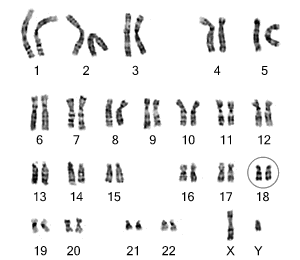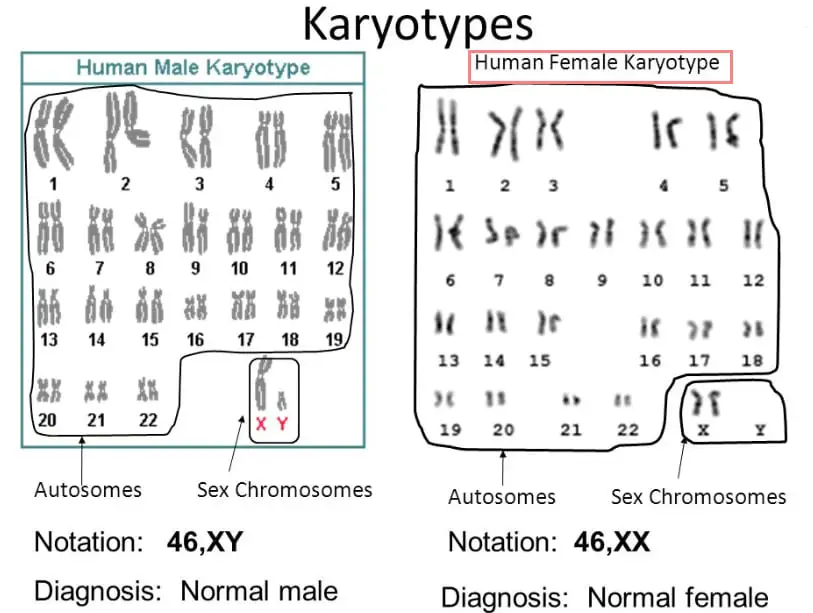Definition Of Science Karyotype
Traditionally a complex karyotype is defined by the presence of more than or equal to 3 or more than or equal to 5 aberrations. Structurally complex karyotype is defined by at least 3 chromosomal aberrations including at least one structural aberration excluding those with clonal evolution of.

Polyploidy Easy Science Science Flashcards Flashcards Easy Science
Karyotype either refers to the actual composition of the chromosomes in a body cell of an individual or species or to the actual diagram or photograph of those chromosomes arranged in their pairs.

Definition of science karyotype. A karyotype is a picture of a persons chromosomes. An example of karyotype is the size number and shape of chromosomes in a persons body. The complete set of chromosomes of a cell or organism.
Used especially for the display prepared from photographs of mitotic chromosomes arranged in homologous pairs. The largest human chromosome number 1 is nearly 250 million nucleotides long and contains about 2200 genes Figure 612 B. A karyotype displays chromosomes in pairs according to size Figure 612 A.
Karyotype also refers to the actual collection of chromosomes being examined. The chromosomes themselves or a representation of them. The term also refers to a laboratory technique that produces an image of an individuals chromosomes.
The chromosomal characteristics of a cell also. Scientists prepare karyotypes by staining cell nuclei placing them on slides and then photographing them through a microscope. To determine or analyze the karyotype of.
Karyotypes describe the chromosome count of an organism and what these chromosomes look like under a light microscope. The CHROMOSOME complement of a cell or organism characterized by the number size and configuration of the chromosomes as seen during metaphase of MITOSIS. Karyotype - the appearance of the chromosomal makeup of a somatic cell in an individual or species including the number and arrangement and size and structure of the chromosomes physical composition composition make-up makeup constitution -.
A laboratory genetic technique to arrange study determine chromosomes and structural abnormalities related genetic anomalies is known as a karyotype Or we can say A genetic technique and common laboratory method to study chromosomal abnormalities its structure and number using microscopic analysis is known as a karyotyping. Today were going to look at the procedures to. Photomicrographs of the stained chromosomes are.
Detecting chromosomal abnormalities is important for prenatal diagnosis detection of carrier status for certain genetic diseases or traits and. The doctor can look to see what chromosomes are damaged or if there are too many or too few. The karyotype is used to look for abnormal numbers or structures of chromosomes.
The characterization of the. Medical Definition of Karyotype. Karyotyping is a laboratory procedure that allows examination of a patients set of chromosomes.
The chromosomes can be seen using proper extraction and staining techniques when the chromosomes are in the metaphase portion of the cell cycle. Examining these chromosomes through karyotyping allows your physician to determine whether there are any abnormalities or structural problems. This entry appears with permission from the Dictionary of Cell and Molecular Biology 11 Mar 2008 Lexicographical Neighbors of Karyotype.
Entry 1 of 2. Collins Dictionary of Biology 3rd ed. Definition of karyotype Entry 2 of 2 transitive verb.
The term karyotype is also used for the complete set of chromosomes in a species or in an individual organism and for a test that detects this complement or measures the number. Karyotype is defined as the general appearance of chromosomes. An organized visual profile of the chromosomes in the nucleus of a body cell of an organism.
A karyotype is a technique that allows geneticists genetic specialists to visualize chromosomes under a microscope. Images of the chromosomes can then be grouped by size using a computer. A karyotype is an individuals collection of chromosomes.
Scientific definitions for karyotype. The most recent recommendations of the ISCN are from 1995. Karyotypes are prepared using cells in the metaphase stage of cell division when chromosomal strands have coiled together and duplicated rendering them easily visible under a microscope after staining.
Kărē-ə-tīp The number and shape of chromosomes in the nucleus of a cell. The smallest chromosome number 21 is about 40 million nucleotides in length and contains about 400 genes.

What Is A Karyotype Chromosome18

Karyotyping Tests Definition Procedure Examples Study Com

What Is Karyotyping Definition Steps Process And Advantages Karyotypinghub Genetic Abnormalities Chromosomal Abnormalities Chromosomal Disorders

Karyotyping Ib Biology Youtube

Karyotyping Procedure Uses Examples Protocol Video Results Interpretation Laboratoryinfo Com

Euploid Karyotypes Cri Du Chat Syndrome Cri Du Chat Chromosome

Karyotype By Trypsin And Wright Stain Banding Representing Mesenchymal Download Scientific Diagram

Karyotype Halloween Themes Math Math Equations

13 1c Identification Of Chromosomes And Karyotypes Biology Libretexts

Teaching Anatomy Chromosome And Chromosomal Disorders Dna Research Chromosomal Disorders Chromosome
1 How Many Chromosomes Are Present In This Karyotype 2 Is This Karyotype That Of A Man Or A Woman Why So Mathsgee Answers Explanations

Karyotyping An Overview Sciencedirect Topics

Karyotype An Overview Sciencedirect Topics

Karyotype A Diagram Of A Person S Chromosomes Note Please Use This Normal Human Karyotype Image To Compare With Those Of People With Genetic Disorders Other





Post a Comment for "Definition Of Science Karyotype"